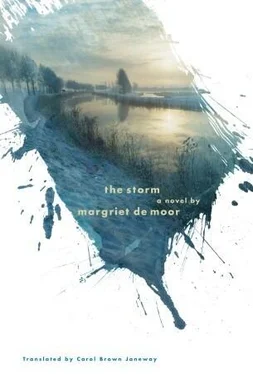In the trailer behind it was a handful of people.
The wind hurled a piece of wrought iron like a curved sword into the room through the windowpane. Everyone flinched. There was a momentary but powerful wave of pressure, the shutter was wrenched out of the back wall of the house, the lamp flared up. Simon Cau had clearly become the kind of man who could just sit there motionless at a time like this, as if he were all alone, but Lidy and the old woman pressed themselves against the wall next to the window, to see what was going on out there. With your arms up shielding your face, wind gusts of more than seventy-five miles an hour feel like glass splinters in your hands and eyes. The old woman, who had cataracts, was relying on the observations of her visitor.
“Make sure you take a good look!” As if she didn’t totally trust the reports of the girl she was already inclined to regard as a daughter or daughter-in-law. Such connections are quick to form in certain circumstances.
The girl kept looking. “It’s him. Hocke.”
They both flashed a glance for help at Simon Cau, but his back was turned, so they looked out of the window again. About a hundred yards away, the trailer, now almost entirely invisible underwater, was transporting a little group of people who could still be seen above the swells and who would have to find a place in the house here. Aside from Hocke she counted seven of them, survivors of a group of families who had lived a few miles from here in a hamlet on a protected island formed of silt where the ditch surrounding the polder divided into two arms — one contained a lock that had been rusted shut for years, and the second ran on until it met the main drainage system at Grevelingen.
Hocke gestured and yelled something that was unintelligible from the window. He had maneuvered the tractor into position right opposite the house and was now apparently trying to figure out how far he could still advance along the road that sloped downward under the water. Meanwhile the travelers he had brought waited, their faces set and cold. They looked as if they had appeared out of the void, resurrected perhaps, but without any idea of where they’d come from, or any expectation that they’d ever find out. Yet the massive current pouring from the north swept past them, carrying entire collections of their random household possessions, from clog boxes, doors, and roof gutters to smaller objects like beds, scales, tobacco jars, birdcages, shoes, a set of false teeth, a baking pan, an edition of Donald Duck . They looked out over it all, not so much blank as unburdened of everything their eyes had known before.
Eight little houses. The wall of water had come at them from one side at the exact moment when Hocke on the other side was trying to get down to them by driving alongside the drainage ditch. The families of two of his farmhands and several day laborers didn’t know which they heard first, the breathless honking of the tractor horn or the bomb that split open their house walls and tore off the roofs. The energy of a hurricane when transferred into water is a mad force in any space that presents obstacles to that force. Shearing its way with razor sharpness along the collapsing dikes, turning, forcing its way to the side, and then streaming back, the flood wave was carrying a pressure of dozens of tons per square meter as it reached the first eight houses on the Naweg and landed on them like a wrecking ball. Most of the inhabitants made it just as far as the ladder in the stairwell. What followed was something that no human being was there to witness.
A fourteen-year-old boy and his father hack a way through the roof tiles with a chisel, pull themselves up hand-over-hand to the ridge beam, hang over it; the next minute a vertical tongue of water sweeps upward, the father drowns immediately, the boy thrashes around in the water, struggling desperately. Another house: a fifteen-year-old girl squeezes herself against the chimney, the roof is torn off, nothing around her but a force-12 wind and the floor heaving under her feet. Her forty-year-old mother, extremely pregnant, lands in a floating laundry cupboard as the house wall collapses outward; she’s been having cramps all night but now they stop. The current will carry her by chance right past the tractor, she will manage to make it, at least to begin with, as does her eight-year-old son, whom Hocke fishes out of a hedge of whitethorn. As the girl falls backward, along with the chimney and everything else, she gives a deafening scream and clutches empty air. It’s pitch black. The sea pushes on from the north with huge force, only to crash into the constricted waters of the Oosterschelde on the south side of the island. The inhabitants try to grab onto whatever they bump up against in the water. Not one of the flimsy houses held together with little more than whitewash withstands the enormous churning movement of the waters triggered by waves that are now breaking under their own weight. A man and two children in striped pajamas are standing on the rear part of a shed that is already sinking. As they land in the water, the man manages to pull them onto a rafter, which immediately shoots away like a torpedo. Lord have mercy — but the man is astounded to find himself groping the road embankment a minute later and crawls up it under the lights of the tractor. It’s snowing. A young married couple and child have been pulling themselves forward along the hedge that lines the road. The man, who’s very strong, is holding his two-year-old daughter above water by her clothing, switching from his right hand to his left. He’s also using his teeth. Hocke, who hears them calling through the darkness, comes to their aid and pulls them onto the wagon. The mother takes the child, who’s been plunged right under the water twice, in her freezing arms. Extraordinarily, the rumble of the Ferguson engine can be heard even through the howling storm. Six or seven rats have popped up out of the water next to the trailer and are climbing onto the tailgate. There’s still room on the trailer, but if they don’t get away from there now, up the gently sloping road, there’ll be no point in trying.
“We’re going!”
He knew the lay of the land around here. Hocke took his bearings from the electric poles and the wind-bowed picket lines of willows and poplars planted after the deliberate inundation by the Germans in 1944. The absolutely critical thing for him was to stay on the road, which laid an underwater trail to his house if indeed it still existed. Working his way forward on an imaginary path, taking an imaginary curve, everything done by guesswork. It was after about ten minutes that Hocke, the one in charge, the only one with a thought in his head, stopped and peered over his shoulder.
At first there was nothing to see but waves crashing and crisscrossing one another in fountains of spray and general chaos. Then suddenly something was yelling and coming toward them, a dot that soon grew until it became a living thing clamped to a bale of hay. Hocke looked, as did the others.
It was a boy, a child, who as the hay bale raced alongside them in the current, slid into the water at the exact right moment, also contriving with considerable skill to dodge the driftwood that was hurtling past as well. Coughing and bleeding — one of the rats landed on him as people pulled him in over the tailgate — he joined the little group, who reached the farmhouse shortly thereafter. The boy’s name was Cornelius Jaeger, he was twelve years old but would soon make an everlasting impression up in the Hockes’ attic because of his deformity — he was a hunchback — and he came from Dreischor. Vague things, the kind one doesn’t notice consciously, but that still led Lidy to the assumption that none of the others knew where this child came from or what his name was.
Читать дальше












